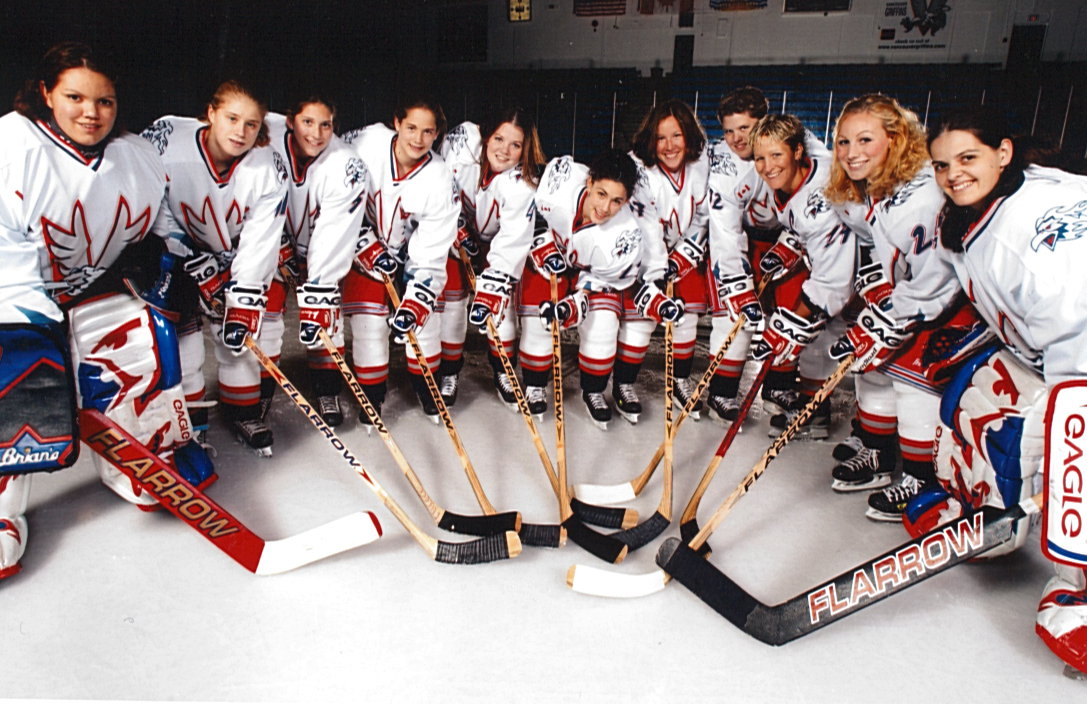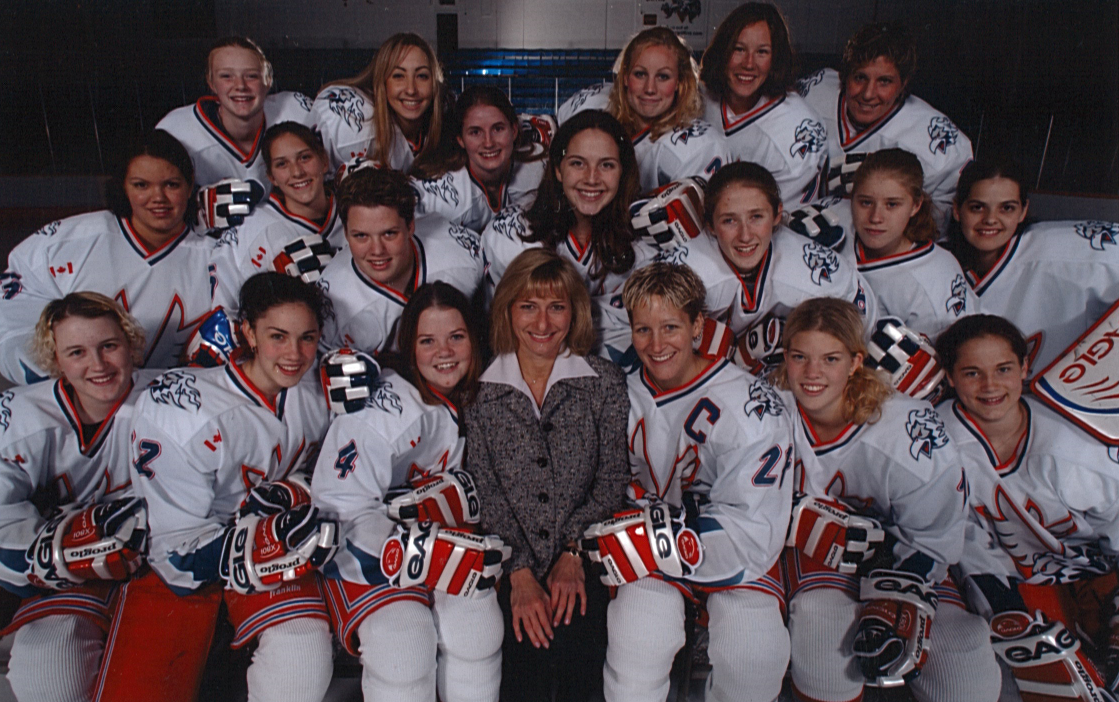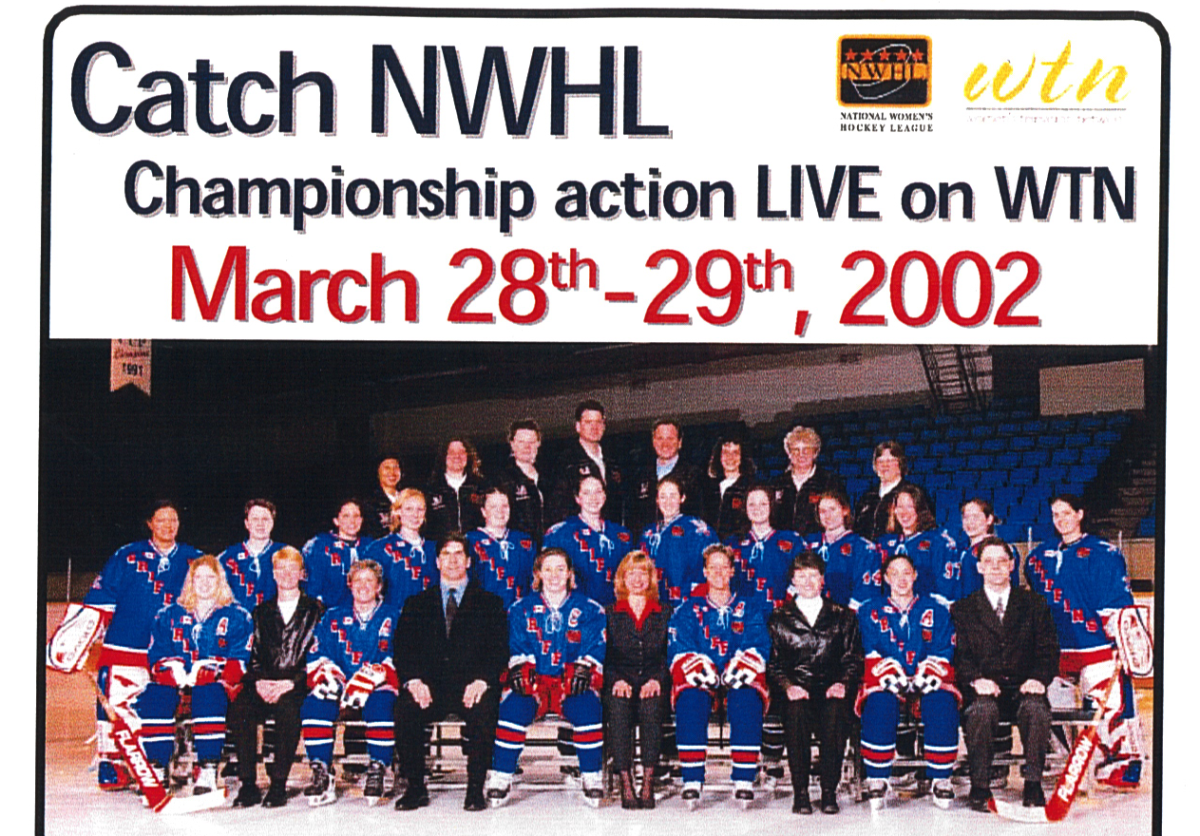VANCOUVER —When you hear “hockey” and “Vancouver” in the same sentence, the first thing that comes to mind for most people is the Vancouver Canucks. Maybe, the Giants. Maybe, the 2010 Olympic gold medal game.

But not as many Vancouver fans remember that there was once a professional women’s hockey team in their city as well.
The Vancouver Griffins entered the scene in 2000, becoming the first women’s professional hockey team in western Canada.
It folded just three years later.
Looking back, former owner Diane Nelson says she was well ahead of her time.
“If I tried to do it now, it would be so much easier,” she said. “Back then, when I said to people, ‘Oh, by the way, I own the Vancouver Griffins of the National Women’s Hockey League,’ they would say to me, ‘Girls play hockey?'”
Nelson’s vision for the Griffins was to bring the best players in the world to Vancouver, but the experience was fraught with challenges every step of the way.
A number of restrictions meant her team had to play on the National Women’s Hockey League (NWHL) schedule, but was also forced to play in the South Coast Female Amateur Hockey League.
“So these women, who are supposedly the best in the world, had to basically play local minor hockey at the same time,” Nelson said. “It’s like taking an NHL team and saying, ‘You are going to go and play in B.C. minor hockey as well.'”
FROM THE VAULTS: Global BC’s Barry Deley reports on the challenges facing the Vancouver Griffins (aired August 2003)

On top of having to find part-time jobs for her players, securing facilities and begging for ice time, travel logistics were one of the biggest headaches for Nelson and her team.
Most of their opponents were based in the East, so travel costs added up quickly.
Nelson also faced restrictions on importing star players.
Nelson made sure everything about her team was professional, mirroring what an NHL team would do.
Her players were decked out in top-notch gear. All Griffins’ games had player introductions, a rendition of the national anthem and even a 50/50 draw.
“You’ve got your referees, announcers that you had to pay. It just became so expensive,” Nelson said.
Despite the challenges, Nelson says the community always had her back and volunteers and members of Nelson’s family spent countless hours helping the team.
The municipality of New Westminster renovated the Queens Park Arena, which was home of the Griffins, to give players a professional dressing room — a simple gesture that Nelson says made a world of difference to her players.
Nelson says Brian Burke, who was the general manager of the Vancouver Canucks at the time, called her up one day and offered to put up ads for Griffins’ games on the Canucks jumbotron.
“It was unbelievable what we had with respect to enthusiasm and interest to help these women,” said Nelson. “We just could not get the fans.”
At best, Nelson says the team attracted a few dozen fans per game. A bigger game would draw, maybe, a few hundred people.
“You literally gave the tickets away because people weren’t going to pay,” Nelson said. “My friends would pay because they knew I needed the money.”
Sylvain Leon, the team’s former head coach, says the Griffins took the level of women’s play to a different level.
“In terms of the marketplace and finding money to run the teams, it was a tough sell,” said Leon. “It was hard to find people who would cough up thousands of dollars in sponsorship with no TV revenue.”
Despite that, Nelson managed to secure the support of five sponsors — including Pepsi and Boston Pizza.
But in the long run, she just couldn’t pull it off financially and had to make a tough choice between going completely broke and keeping the team going.
“We were doing all the right things, it’s just that it was so financially difficult to even try,” said Nelson. “I was hoping that I could find someone who had the financial resources to back me.”
But, that backing never came.
“It was the most difficult day of my life when we folded,” says Nelson.
FROM THE VAULTS: Vancouver Griffins’ owner Diane Nelson talks about why she could not keep running the team (aired November 2003)

What’s the future of women’s hockey?
Sixteen years down the road, Nelson says the women’s game has made incredible strides, and interest in the game is also on the rise.
Canadian women have dominated the international hockey scene for years, winning gold at every Olympic Winter Games since 2002.
The most recent Ice Hockey Women’s World Championships that took place in Kamloops last month saw 5,850 people attend the final game between Canada and the United States.
Although it’s a far cry from the attendance records set by men’s teams, more than 38,000 fans came to watch the women play.
READ MORE: Is women’s hockey an endangered Olympic event?
Brenda Andress, commissioner of the Canadian Women’s Hockey League (CWHL), the league that followed in the footsteps of the NWHL, says fan attendance has improved since the league’s launch eight years ago.
In 2008, for example, Les Canadiennes Montreal had an average of 36 fans coming to their games. In 2015, they averaged 700.
The Calgary Inferno — one of the most successful teams in the league that boasts four-time Olympian Hayley Wickenheiser on its roster — sees an average of 300 fans a game, compared to an average of just 50 spectators three years ago, most of whom were family and friends.
Still, these are hardly the numbers investors want to see.
Global News reached out to companies that supported the Vancouver Griffins in the past to see if they would consider renewing their sponsorship should a new professional women’s hockey team appear on the horizon, but has not heard a definitive answer back. Only Pepsi would say they don’t typically comment on their sponsorship strategy.
Andress says their league receives no provincial or federal help, despite being the only professional women’s sports league in Canada, but has a number partnerships within the NHL.
“We have always had open discussions and conversations with the NHL as a whole, but those are discussions that we continue to have,” Andress said.
The Canadian Women’s League is currently comprised of only five teams – Calgary Inferno, Brampton Thunder, Les Canadiennes Montreal, Toronto Furies and Boston Blades.
Andress says their plan is to grow the game across Canada and she doesn’t rule out the possibility of a team based in Vancouver or Edmonton in the future, but the strength is not in numbers.
“Having the teams that have the ability to put a good product on the ice, that the community can back and the sponsors can believe in it, is absolutely essential,” she said.
Where is the investor?
Andress says starting and maintaining a successful professional sports team requires deep pockets and attracts a very particular kind of investor.
“Anybody who is in the business of owning a sports team, very few people make money,” she said. “You are doing it because you love the game. For an investor to come in and say, ‘I am going to make money off of this,’ that’s not very likely.
“So it’s not viable to say this is going to be a great opportunity down the road for me to buy a team and make money, but it’s a great opportunity for somebody to come in and change the history of women’s hockey.”
Andress says the league went from 100 per cent sponsorship dollars in 2008 to 58 per cent sponsorship dollars, which means that the rest of it — 42 per cent — is made up from ticket revenue and merchandising.
“That’s a big difference because you are not relying on one specific area.”
She says they are seeing more sponsors come in, recognizing the value of being involved in women’s hockey.
But the kind of money involved in their league still means none of their players can support themselves just by playing hockey.
“Nobody can do that… not one,” said Andress. “These women are pioneers of making a difference for women who will come after them. But right now, they can’t earn a living with a skill they were born with. They have to have another job.”
What will it take to get fans to watch?
Nelson says until people are aware of local players and their level of skill, no team will ever be successful.
Looking back at her experience with the Griffins, Nelson knows all too well it takes a prodigious effort to get fans into their seats.
“For me, it was the most challenging thing — to get people to see it,” she said. “Once they saw it, I always had somebody come up to me and ask how they can get involved and help me. One thing is talking about it, another thing is going to it.”
Andress echoed Nelson’s comments, saying all it takes to support women’s hockey is just buying a ticket to the game.
“I need you, the fan, to get involved,” she said. “I need you to go to the games because if I can fill up an arena of 5,000 per night, the sponsors, advertisers and investors will come. There won’t be a Vancouver team if the arena is empty every night.”
Global News hit the streets of Vancouver to find out whether the city would welcome another women’s hockey team. Here’s what people had to say.

Let us know what you think by voting in our poll below.







Comments